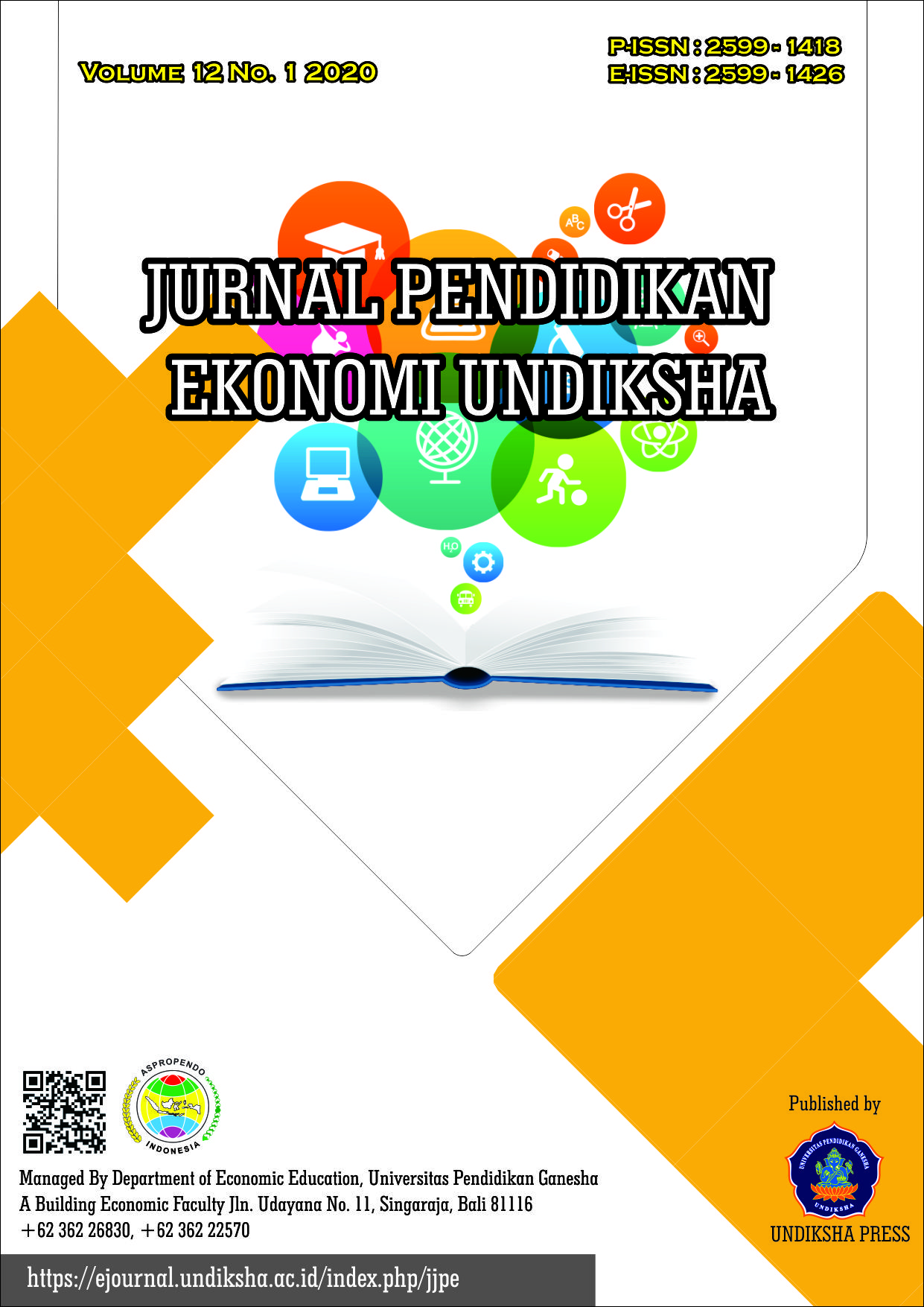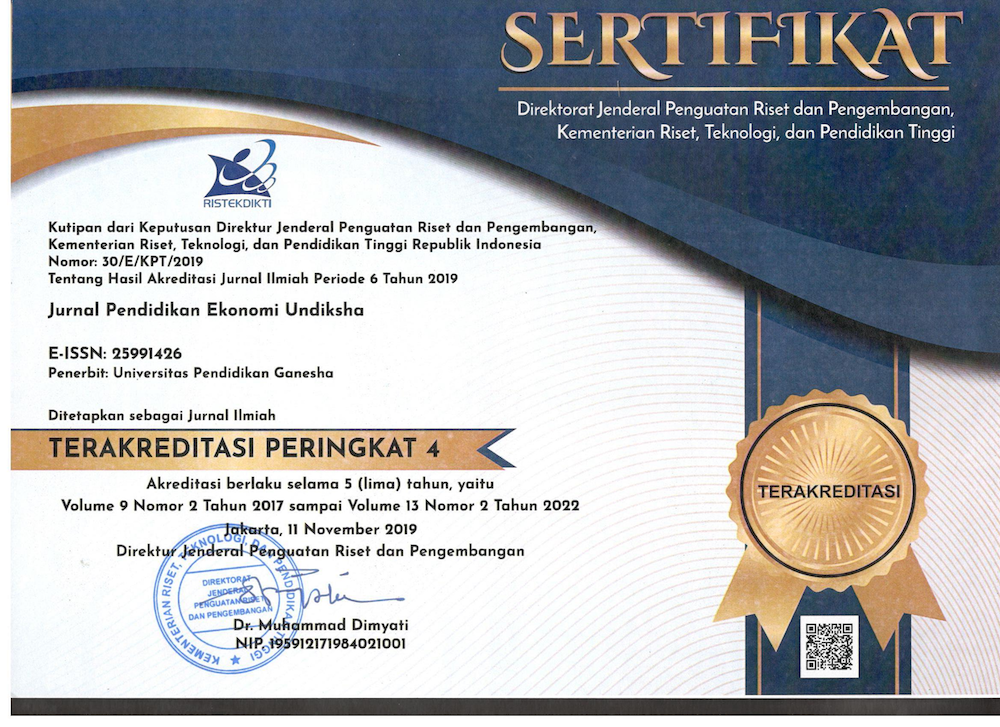Pengaruh Motif Berprestasi dan Self Efficacy Terhadap Pencapaian Target Penjualan Distributor
DOI:
https://doi.org/10.23887/jjpe.v12i1.22929Kata Kunci:
achievement motives, self efficacy, sales targetsAbstrak
This research aims to determine the effect of achievement motives and self efficacy on the achievement of sales targets for Tiens Bali distributors partially and simultaneously. This research design using a type of causal research. The population of this study were all distributors registered at Tiens Authorized Store 618 are 4.169 people. The sample of this study amounted to 371 respondents using the proportional random sampling method. The data collection technique was carried out by distributing questionnaires with a Likert scale and processed using multiple linear regression analysis technique. The result of data analysis showed that there was a partially positive and significant effect on the achievemnt motive towards achieving the sale target of Tiens Bali distributors, shown from the value of t=13.491 with a Sig. of 0.000 less than 0.05. Self efficacy, partially has a positive and significant effect on achieving the sales target of Tiens Bali distributors, shown from the value of t=12.915 with a Sig. of 0.000 less than 0.05. Achievement motives and self efficacy have a simultaneous positive effect on achieving sales targets of Tiens Bali distributors, shown by the value of F=323.925 and a Sig. of 0.000 less than 0.05.
Referensi
Arikunto, S. (2006). Prosedur Penelitian Suatu Pendekatan Praktik. Jakarta: PT Reneka Cipta.
Brown, J. . (2013). Self-Efficacy Theory, 13–38.
Ghozali, I. (2018). Aplikasi Analisis Multivariate dengan Program IBM SPSS 25 (9th ed.). Semarang: Badan Penerbit Undip.
Hidayat, C. (2010). Kontribusi Motivasi Kerja dan Penjualan Sales Person. Binus Business Review, 1(1), 222–232.
Intan, G. A. (2017). Pengaruh Self Efficacy dan Motif Berprestasi Terhadap Kinerja Agen Pemasaran Asuransi Equity Life Indonesia Cabang
Renon Denpasar. E-Jurnal Ekonomi Dan Bisnis Universitas Udayana, 4, 1547–1574.
Kasmir. (2014). Kewirausahaan. Jakarta: PT Rajagrafindo Persada.
Kotler, P. dan K. L. K. (2016). Marketing Management. New Jersey: Pearson Pretice Hall, Inc.
Kuwado, F. J. (2018). Jumlah Entrepreneur di Indonesia Jauh di Bawah Negara Maju, Ini Kata Jokowi.
Mangkuprawira, S. dan A. V. H. (2007). Manajemen Mutu Sumber Daya Manusia. Bogor: Ghalia.
Maryam, S. (2015). Self Efficacy Anak Didik Pemasyarakatan di LAPAS Anak Kelas IIA Blitar. Universitas Islam Malang.
Permatasari, A. A. (2015). Hubungan Antara Motivasi Kerja dan Kinerja Pada Karyawan Marketing di Distributor Ban “X” Bandung. Universitas Kristen Maranatha.
Prasetyo, F. B. S. (2019). Hubungan antara Gairah Fisiologi dengan Efikasi Diri pada Sales Counter Ilufa Distribusindo. Universitas Sanata Dharma.
Sugiyono. (2012). Metode Penelitian Kuantitatif,Kualitatif dan R&D. Bandung: PT Remaja Rosdakarya.
Suharyadi, D. (2007). Kewirausahaan: Membangun Usaha Sukses Sejak Usia Muda. Jakarta: Salemba Empat.
Suryana, Y. & B. K. (2010). Kewirausahaan: Pendekatan Karakteristik Wirausaha Sukses. Jakarta: Kencana.
Sutrisno, E. (2015). Manajemen Sumber Daya Manusia. Jakarta: Kencana.
Syahyono. (2016). Pengaruh Motivasi Divisi Karyawan Marketing terhadap Tingkat Penjualan. Jurnal AKP, 6(1), 1–17.
Tenardhi, B. T. (2012). The 8 Continuums of Sales Management Process. Jakarta: Raih Asa Sukses.
Triningtyas, D. A. (2016). Dasar-Dasar Kewirausahaan. Jawa Timur: CV AE Media Grafika.
Umar, H. (2005). Riset Sumber Daya Manusia Dalam Organisasi. Jakarta: PT.Gramedia Pustaka Utama.
Wijaya, Agus, D. (2015). Kepemimpinan Berkarakter. Sidoarjo: Brilian Internasional.
Yusuf, R. I. (2019). Efikasi Diri dalam Akademik dan Kepemimpinan Mahasiswa: Sebuah Penelitian Empiris. (Rusmana, Ed.), The Future of Organizational Communication In The Industrial Era 4.0 ((Eds)). Bandung: Media Akselerasi.
Zainuddin. (2016). Pengaruh Kepuasan Kerja, Motivasi, Komunikasi Interpersonal, Self Esteem, dan Self Efficacy Terhadap Kinerja Individual (Studi Empiris Pada Distributor Tiens Unicore di Makasar). El Muhasaba: Jurnal Akuntansi, 6(2), 1–19. https://doi.org/10.18860/em.v6i2.3905





